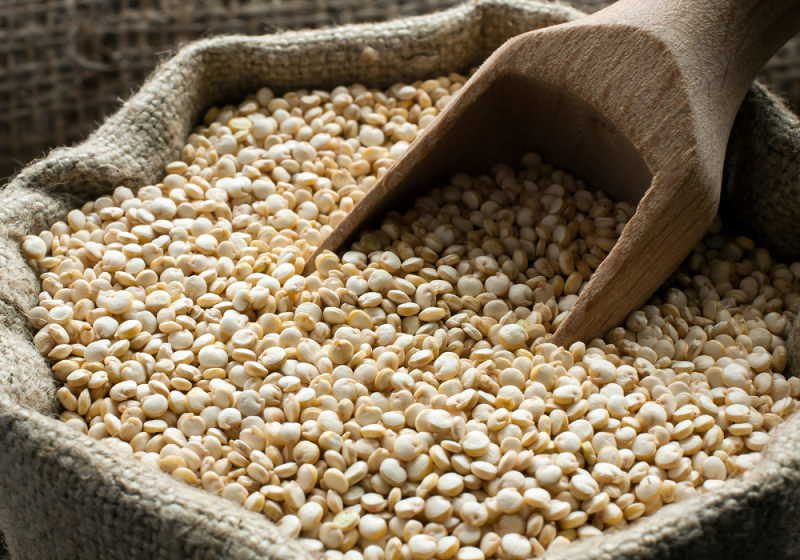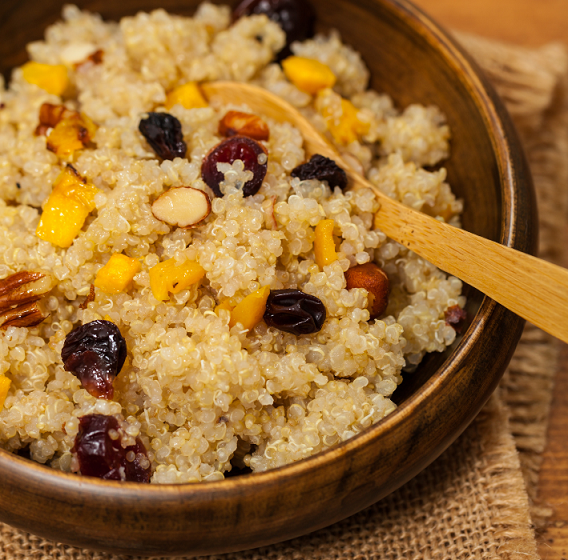Did you know that the popularity of the quinoa, This small seed, cultivated for millennia on the high plateaus of South America, continues to gain popularity due to the health benefits it provides. Indeed, quinoa is one of the rare plant-based foods that contains all the essential amino acids. With several nutritional advantages, it easily replaces traditional grains and enriches our diet.
In this article, we will delve into the world of quinoa and its benefits, explore its numerous advantages for a nutrient-rich diet and health, understand how it has conquered the world of nutrition, and why it has become such a valuable ally.
The nutritional values of quinoa ?
Quinoa is an exceptionally nutritious food. Belonging to the family of Chenopodiaceae, it is considered a pseudo-cereal and is a gluten-free food, making it perfectly suitable for people with gluten allergies. We have discussed the main nutritional values of quinoa in detail in our article on How to prepare quinoa (Cooking time).
In summary, quinoa is a highly nutritious food, recognized for its remarkable content of proteins, complex carbohydrates, dietary fibers, healthy fats, vitamins, and minerals. Its high protein content makes it an ideal choice for those seeking high-quality plant-based protein sources. Additionally, its high fiber content contributes to digestive health and regular bowel movements. Quinoa is also a valuable source of vitamins B1, B2, and B3, which are essential for energy production, nutrient metabolism, and nervous system health. Finally, its healthy fatty acids, including linoleic acid and oleic acid, are beneficial for heart health and reducing inflammation in the body. Due to its unique nutritional profile, quinoa has many health benefits and is an excellent choice for a healthy, balanced, and varied diet.
How many calories are in a 100 g serving of quinoa ?
A portion of 100 g of cooked quinoa contains approximately 120 to 130 calories, ", and about" 368 calories for 100 g of raw quinoa. Calories can slightly vary depending on the type of quinoa and the cooking method used. For example, the Anjou quinoa White quinoa, which is perfect for germination, will provide you with the maximum of its benefits and nutrient-rich calories if you consume it raw and sprouted. It is a rich food that is considered relatively caloric, but it is important to note that these calories mainly come from complex carbohydrates, proteins, and healthy fats it contains, making it a nutritious option in a balanced diet. Incorporating quinoa into your diet can help support good health thanks to its various nutritional qualities.
Is quinoa considered a starchy food ?
Yes, the quinoa It is often considered a starchy food because it contains complex carbohydrates such as starch, which makes it a starchy food, and also as a pseudo-cereal because it is used in the same way as cereals despite being a grain. Additionally, it has a high fiber and protein content and does not contain gluten compared to traditional cereals. Due to its nutritional composition and texture, it is often used as a substitute for starchy foods such as rice, pasta, or potatoes in meals.
Grains contain complex carbohydrates, which give them a slightly creamy texture when cooked. Although quinoa is considered a starchy food, it stands out from traditional starches due to its higher content of plant-based protein and nutrients. This is why quinoa is often favored by those looking for a healthier alternative to classic starches.

What are the benefits of quinoa ?
Quinoa offers many health benefits. Here are some of the benefits of quinoa:
It is a source of complete proteins and fiber: Quinoa is an excellent source of complete plant-based proteins; it is among the rare foods that contain all the essential proteins the body needs (for those who don't know what an essential protein is, it's a protein that the body does not produce and must be obtained from our diet), a miracle of nature, isn't it! This means it contains all the essential amino acids necessary for building and repairing tissues in the body. Its high fiber content is particularly beneficial for maintaining a healthy digestive system, promoting intestinal transit, and helping to prevent gastrointestinal issues such as constipation. Therefore, it is the ideal food for people following a vegetarian or vegan diet, as well as for those looking to increase their protein intake.
Effective for controlling blood sugar: Quinoa has a relatively low glycemic index compared to other carbohydrates, which means it causes a gradual and moderate rise in blood sugar levels and can help maintain stable blood sugar levels. This makes it an excellent food for people with diabetes or those looking to regulate their blood sugar levels.
An excellent antioxidant: Quinoa is among the foods rich in antioxidants, such as flavonoids and phenols, which help protect the body's cells from damage caused by free radicals and are responsible for many diseases. Thus, quinoa contributes to the prevention of chronic diseases, such as heart disease, cancer, and neurodegenerative diseases.
A gluten-free food: One of the unique characteristics of quinoa is that it is naturally gluten-free, making it a safe alternative for people who have a gluten intolerance or who have celiac disease in order to avoid any intestinal problems related to gluten.
Help to combat anemia: Quinoa can help combat anemia due to its iron content. Anemia is a condition characterized by a low number of red blood cells or hemoglobin in the blood, which leads to a decreased transport of oxygen to the body's tissues. Iron is an essential nutrient for the production of red blood cells and the formation of hemoglobin. Quinoa is an excellent source of iron, which will subsequently be absorbed and used by the body for the formation of red blood cells.
Is quinoa good for the intestines ?
Yes, quinoa can be beneficial for gut health:
- Quinoa is a good source of dietary fiber, as we mentioned earlier, including both soluble and insoluble fibers. These fibers play an important role in regulating intestinal transit. They also help prevent constipation by increasing the volume and consistency of stools.
- This pseudo-cereal contains prebiotics, which are specific fibers that nourish the good bacteria present in the colon. Prebiotics promote the growth and balance of beneficial bacteria in the intestine, which can contribute to better digestive health.
- Quinoa is considered easy to digest compared to other cereals or grains because it is naturally gluten-free, making it an excellent option for people with celiac disease or gluten intolerance. Its light texture and balanced nutritional composition can be well tolerated by many people, including those who have difficulty with more processed grains or those containing gluten.
- Quinoa can reduce inflammation in the digestive system thanks to the antioxidants it contains. Chronic inflammation of the intestine can cause digestive problems and be associated with diseases such as inflammatory bowel disease (IBD). Therefore, it is important to choose what we eat carefully.

Can quinoa help with weight loss ?
Weight loss has become a major issue for many people. Many of you have already tried following strict diets, engaging in intense sports, or even stopping eating, but to no avail! To lose weight, the key is to engage in regular physical activity and maintain a healthy diet that is good for your health.
The focus should be on nutrition for people who want to lose weight because, as they say, "The secret to losing weight lies in the plate." Among the foods that help with weight loss is, you guessed it, quinoa! It is an excellent source of protein and fiber and a good source of nutrients, so it can help reduce appetite and promote satiety, which can contribute to more moderate food consumption and a reduction in calories ingested.
Thanks to its high fiber content, feelings of hunger are reduced, as well as the desire to snack between meals. Its low glycemic index plays a role in the release of carbohydrates throughout the day, causing a slower release of glucose into the blood. This helps maintain stable blood sugar levels, avoiding the sharp spikes and drops in blood sugar that can stimulate hunger and cravings. You can also use it as a healthy alternative to more caloric starchy foods, such as white rice or pasta. By substituting these foods with quinoa, you can reduce your caloric intake while benefiting from the essential nutrients it offers.
What are the contraindications and allergies to quinoa ?
Although quinoa is generally considered safe for most people, there are some contraindications and potential allergies to take into account. Here are some important points to note:
- Quinoa can cause allergies in hypersensitive individuals. Symptoms of a quinoa allergy may include itching, hives, facial swelling, respiratory problems, or difficulty swallowing.
- Some people may exhibit a sensitivity or intolerance to quinoa, which can cause digestive symptoms such as bloating, abdominal pain, or gastrointestinal issues.
- In some cases, quinoa can be contaminated by other gluten-containing grains, such as wheat or barley, during harvesting, processing, or handling. This can be a problem for people with celiac disease or gluten sensitivity. It is important to look for certified gluten-free quinoa brands if you are following a strict gluten-free diet.









